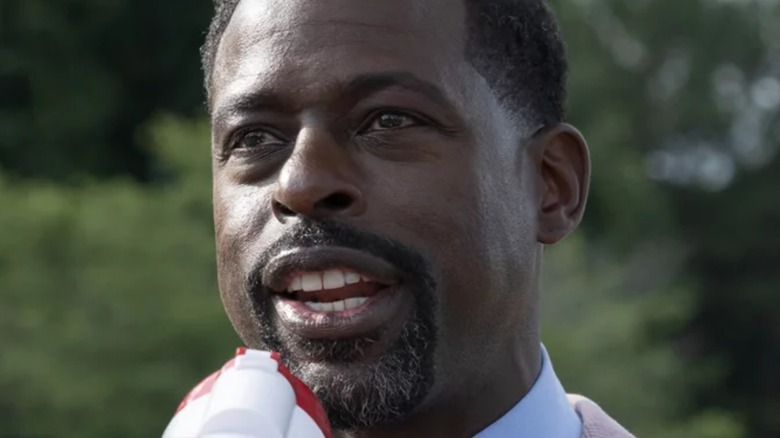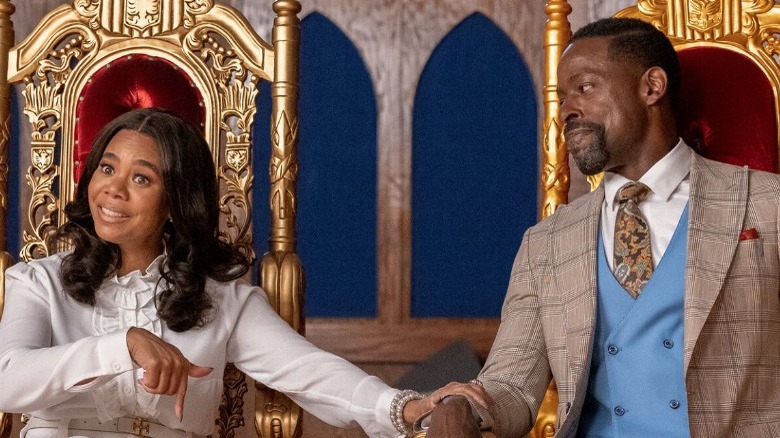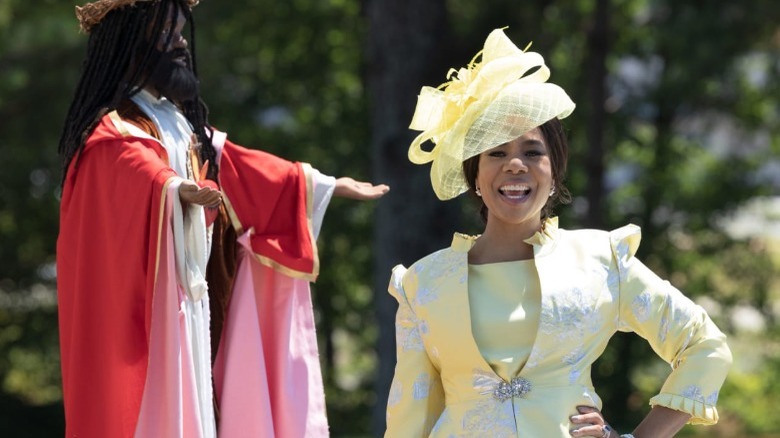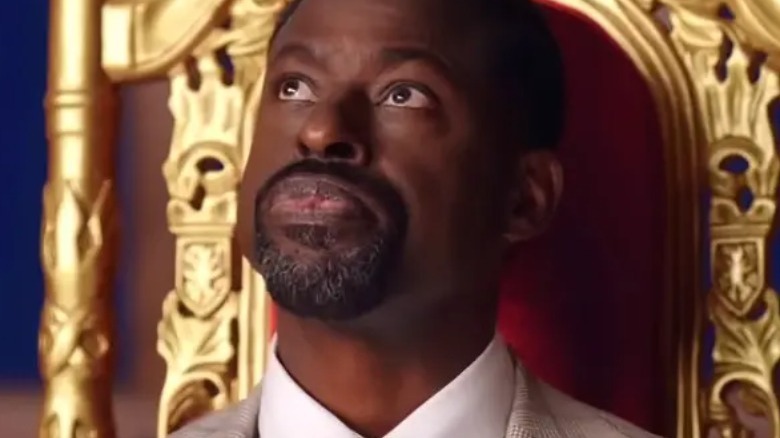The Ending Of Honk For Jesus. Save Your Soul. Explained
"This Easter is our revival. Our renaissance. We winners, baby. You married a winner," Lee-Curtis (Sterling K. Brown) proclaims emphatically to his silent wife. As a preacher of a megachurch, LC and his wife, Trinitie Childs (Regina Hall), have certainly seen better days. But now, LC is attempting to leap past a scandal that ripped his career asunder. He wants his congregation back, and more importantly, he wants his career as a showman in the spotlight to gain a much-needed resuscitation. Trin, on the other hand, longs for a lifestyle she once had. She believes that she has paid her dues, and it's time for her husband to once again reclaim his empire at their church, Wander to Greater Paths. Trin is also extremely disillusioned by the rigors of Christianity and the judgments of her husband's former congregants as well as her own mother.
While "Honk for Jesus. Save Your Soul." might be considered a comedic affair. There are actually fewer laughs than one might expect. The film is more of a satirical view of real-world people in high places. It might seem like the overindulgences of LC and Trin are laughable, but they are actually remarkably sad given the framework that's established by the film. This duo isn't a team nor are they a committed marriage — their relationship is an empty husk. The film is rife with subtext and commentary, both on the current state of affairs within society and "cancel culture" at large as well as those who perpetually feed their own ego seeking the limelight like a moth driven to a lone street lamp. With that said, let's dig into the substance of "Honk for Jesus. Save Your Soul." and flesh out its biggest messages.
The following article includes discussions of sexual misconduct and spiritual abuse.
A career-ending scandal
The core premise of the film is focused on Lee-Curtis and Trinitie attempting to reclaim their places as pastor and first lady respectively at a Southern Baptist megachurch. Why do they have to seek such a reclamation? Well, LC was involved in a purportedly unsavory scandal. Now the film never delves into the specifics of the sex scandal that brought a big-time hotshot like LC to his knees, but there are plenty of clues that basically point to sexual impropriety with young men that the pastor had groomed. While it appears that LC never faced jail time for his actions, the perverse nature of the allegations was enough to send his flock running for the exit. Of course, LC insists that all of the allegations are false.
Does this sound at all familiar to you? It's difficult to imagine that it wouldn't even if you've never seen the film. It truly feels like a headline ripped from a real-world newspaper sadly enough. And while we're not here to comment on the merits of organized religion, it's a sin worthy of shunning from the most overzealous fanatics despite a religion rooted in repentance and forgiveness. On the other hand, LC never even seemed to truly be humbled by the experience. He still lives on cloud nine fantasizing of a faux reality where his congregants will return and accept him with open arms. What we do know about LC's sin is that it left a scar that runs deep with the victims involved. Near the end of the film, a young man by the name of Khalil (Austin Crute) approaches LC and is completely disgusted by the former pastor's attempts to be noticed once again.
If you or anyone you know has been a victim of sexual assault, help is available. Visit the Rape, Abuse & Incest National Network website or contact RAINN's National Helpline at 1-800-656-HOPE (4673).
The tenuous marriage of Lee-Curtis and Trinitie
As Lee-Curtis, himself, once preached, marriage isn't an easy thing. It takes work, discipline, and sacrifice. But he shares that it ultimately can be a blessing should both parties be putting in the effort. Fast forward to the present times and let's just say that his marriage feels a bit one-sided. When the two attempt to have intimacy, LC struggles to perform. He requests that Trinitie "do the other thing." That, of course, is satisfactory for him but he doesn't return the favor. For reasons unknown, Trin continues to stand by her husband despite the man failing to meet any of her needs.
Comments from former congregants highlight how LC and Trin's marriage must have a strong foundation to weather such a torrential storm. But the reality is that the soul of their marriage likely ended during the scandal. While Trin is seen in recordings of past sermons happily cheering on her husband, she's now forcing herself to smile for the cameras. She's consistently at odds with her husband's decisions during their plans to revive WTGP church, and even appears disaffected when LC nitpicks her style choices. Of course, the telltale sign comes when Trin confesses her dissatisfaction with her marriage to her mother, Sabina (Avis Marie Barnes), and even tearfully explains how she doesn't see their marriage lasting. After her mother scolds her for her vulnerability, she resolves to stick by her husband out of duty instead of love.
The double life of Lee-Curtis
The Lee-Curtis that was projected to the masses isn't the real person that he is on the inside. For one reason or another, LC has adopted a persona that isn't uniquely his own. But he's become enmeshed with it and addicted to the spotlight that it garners him. Regardless, it becomes apparent that LC can no longer fake intimacy or affection with his own wife. While he preaches against homosexuality at the pulpit, it's no secret that he is a closeted gay man. While he's never once forthright with his truth, the façade crumbles when he interacts with Basil, the audio technician. LC puts his feelers out to discover that Basil is gay. After the pastor comes on to the young man, Basil informs him that he already has a boyfriend.
LC's need to suppress his truth ultimately leads to his own detriment. After all, it's what led him to groom young men as potential (or actual) sex partners. He's clearly not happy in his own marriage and seeks out the connection he craves in a secretive and manipulative manner. At the heart of the matter, is a man who ultimately has taken his true self and attempted to lock it away in a box for the sake of an empty career as a pastor preaching words that he likely doesn't even believe. He has, however, tricked himself into believing that he can save himself and others. LC has latched onto a superiority complex that can only be satiated when others need him.
If you or someone you know is dealing with spiritual abuse, you can call the National Domestic Violence Hotline at 1−800−799−7233. You can also find more information, resources, and support at their website.
When religion becomes business
LC and Trinitie may have gotten their start through their enduring faith and belief in the words taught in the good book. Or, perhaps, their acceptance of Christianity was merely the "social" thing to do. Whatever the case may be, organized religion is supposed to offer comradery, comfort, and a purpose. However, all too often religion becomes a money-making business where the pastor rides high off the monetary contributions of their fervent congregation. LC, being the pastor of a megachurch, relishes in his Gucci attire, owning a Bugatti, and having a massively loaded closet that'd make Lady Gaga blush. It's clear that he's taking his cut of the proceeds.
But LC learns that business is not always friendly. When Keon (Conphidance) and Shakura Sumpter (Nicole Beharie) interrupt LC's plans at a revival, he and Trinitie attempt to sway the youthful pastors and the opening of their newest location to shift to a different day other than Easter. The couple initially refuses, but when LC and Trinitie move up their own revival a week ahead of Easter, Keon and Shakura do the same claiming they didn't know of the change being made by LC and only making the move with the intention to aid their revival on Easter. Clearly, the Sumpters are playing mind games and knew exactly what they were doing. They're now the top dogs on campus and they don't want any of their congregation's money heading back over to the WTGP church. That's not very Christ-like. But business is business.
Lacking self-awareness
Lee-Curtis and Trinitie stage a comeback by inviting a documentary crew to film their exploits as they revive their careers as leaders of a grand church. He wants the world to see all the hard work and effort that he puts into his redemption story, and filming it is a way to control how others see that redemption. Despite LC and Trin's lives being on full display, they don't shy away from the lavish lifestyle they've been able to afford.
Any comeback story would usually feature a broken and humbled man seeking forgiveness and acceptance back into the general community. However, LC is neither humbled nor self-aware of his haughty arrogance. He's just as much of a braggart as the pre-scandal days when he'd tout his possessions as a show of high favor from the Lord above. LC scolds his wife's choice of head attire. he complains like a child about gum on his shoe insisting that it will hinder his appearance and, therefore, his success. And he relishes in his own re-baptism as a feat of salvation once again achieved by him alone. Whatever you might feel about religious zeal, most would understand the concept of salvation — something that can only be granted by a deity. But LC seems to fancy himself a god. Once he's confronted by his shameful past in the form of Khalil's mockery, he belligerently professes to have saved Khalil and countless others, including himself. And even when all hope is lost and their revival is a bust, he still adamantly insists that people will come to "see him." His social ineptitude, narcissism, and blindness are his own downfall.
The irony of the unrepentant and unforgiven
Just like any prideful televangelist or preacher mired in scandals, there's a certain irony that exists by the very nature of their careers. As professed men and women of God, they are to be the standard for their flock. The tenets of Christianity plainly discuss the many sins which infallible human beings are likely to commit. However, the core of the religion is that Jesus Christ's sacrifice enables humanity to repent and seek forgiveness. Furthermore, Christ's gospel, as seen in the New Testament, is rooted in service and love shown to others. Christ commands all to forgive neighbors of their trespasses. It's a simple concept to wrap one's mind around when we all realize that we're imperfect even if it's difficult to enact in practice.
However, "Honk for Jesus" presents a couple who are disciples of God who are anything but repentant. Lee-Curtis seemingly jumped from undergoing the allegations levied against him to plotting his return. Typically, an apology fits somewhere in the middle of those two events. Yet, LC adamantly declares he is innocent and never seeks to make amends for his alleged misdeeds, even if, for some reason, they were embellished and inaccurate. But if the fire in Khalil's eyes is any indication, LC wronged these young men. But he doesn't seem to care. All he wants is to be loved and adored by the masses once again. So, much so, in fact, that he's willing to embrace an ideology that completely condemns his own sexual orientation.
If you or anyone you know has been a victim of sexual assault, help is available. Visit the Rape, Abuse & Incest National Network website or contact RAINN's National Helpline at 1-800-656-HOPE (4673).
There is no room for being genuine in showbusiness
Sure, Lee-Curtis might be wrapped up in his own world, but beneath all the religious fervor and arrogance is a dash of humanity. In the two days preceding the revival of WTGP church, he practices his opening sermon with Trin sitting in a side pew. His wife offers her persistent critical takes on LC's performance. Mostly, she doesn't feel like LC is convincing enough and that he's lacking a certain zeal that'll connect with the crowd. "Convincing" is the operative word here. Trin's use of the word might show that even she doesn't believe in the words spoken by her husband. But it's a direct command to LC to "act the part." It's all a show, and if he fails to connect with the congregation, that'd spell the end for WTGP church.
The painful truth is that we viewers can sense a profound hint of sincerity in LC's sermon about how God doesn't make perfect men. He even holds back a show of emotion as he talks about his own challenges. But after shifting the topic into the light, he claims that God may not make perfect men, but with a little finesse and growth, he can make great men. There are still remnants of the typical LC ego, but as far as sermons are concerned, it's the most grounded the man has ever sounded throughout the entire film. Yet, it isn't enough for Trin. She still thinks it isn't worthy of a revival sermon. After LC informs her that he gave her everything he had, she delivers a cutting blow by telling him it still needs to be "more convincing."
Trading unhappiness for greed
Trinitie is, perhaps, the most tragic character in the film. In fact, the third act ultimately puts Regina Hall front and center. She delivers an impassioned performance as she debates the future of her own marriage. Deep down, she has to know that LC can't connect with her on an emotional level. Whether that's because of his sexual orientation or because he's too wrapped up in himself is anyone's guess. If it was the former, they somehow managed a 15-year marriage in which everything seemed a bit more blissful (at least on the surface) before the scandal came to light. She eventually confides in her mother that she can't continue on and that her marriage is a sham at this point. Trin and LC are simply two different people with radically different ideas.
Trinitie's mother, Sabina, unfortunately, scolds her for her vulnerability by stating that Trin isn't sounding very Christian having such thoughts. It's a show of religious cultures imposing a level of toxicity on their own communities encouraging women like Trinitie to stay in relationships that make them unhappy. Sabina goes on to say that she wasn't ever entirely happy with Trin's father, yet she stuck it out. Afterward, Trinitie declares that she is committed to LC for better or worse and acts like the congregants who once attended their church owe her and her husband their undivided attention. She's beginning to adopt an entitled attitude because of her own misery. Essentially, she decides to remain unhappy with LC in an effort to regain the lifestyle she once had.
The hat
As the couple prepares for their big day, both Lee-Curtis and Trinitie decide to find their Sunday best. They put so much stock in their own fashion that LC believes that if he doesn't look the part, that will hinder their success. Trin goes shopping for a new Sunday hat. She finds a lavish bejeweled hat with a hefty price tag. But, of course, the duo still seems to have plenty of wealth from their heyday. So, a hat costing over two grand is small potatoes, for now. However, the hat represents Trin's desire to hold on to the finer things in life. She clearly misses her old life as the first lady. If LC can't reclaim his seat at the head of the WTGP table, the couple won't be able to continue their ritzy way of living for much longer.
On the other hand, LC hates the hat. On multiple occasions he remarks to her how he thinks she should "lose" the headwear. LC feels the hat is simply out of place. Ultimately, it's a representation of his lack of support for his wife focusing on his self-centered need for attention above all else. Truthfully, he doesn't want to be upstaged by Trinitie when it comes to appearances. LC's vanity knows no bounds.
The examination of cancel culture and public redemption
"Honk for Jesus" is a satire in the sense that it highlights two major elements of modern society: cancel culture and public redemption. Cancel culture existed long before it was given a name. For decades, public figures have often been held to a certain standard and were ousted when skeletons in the closet were unveiled. It's only in present-day settings that we've now taken harder lines toward sexual impropriety and malicious attacks on others whether verbal or physical. In an age of social media, all of these things can no longer escape the public eye.
"Honk for Jesus" examines cancel culture and the impact that it has on those affected. Ultimately, those who consider themselves public servants have a duty to uphold a certain standard. When that trust is fractured, redemption is often nearly impossible. It doesn't take just one or two people to forgive a public figure for their trespasses. It takes an entire community to reinstate their position as a thought leader or politician or whatever the case may be. Public redemption doesn't come easy for those who've been banished from the spotlight. "Honk for Jesus" demonstrates this, as no amount of overtures or marketing can bring LC back from the depths that he has fallen.
If you or anyone you know has been a victim of sexual assault, help is available. Visit the Rape, Abuse & Incest National Network website or contact RAINN's National Helpline at 1-800-656-HOPE (4673).










